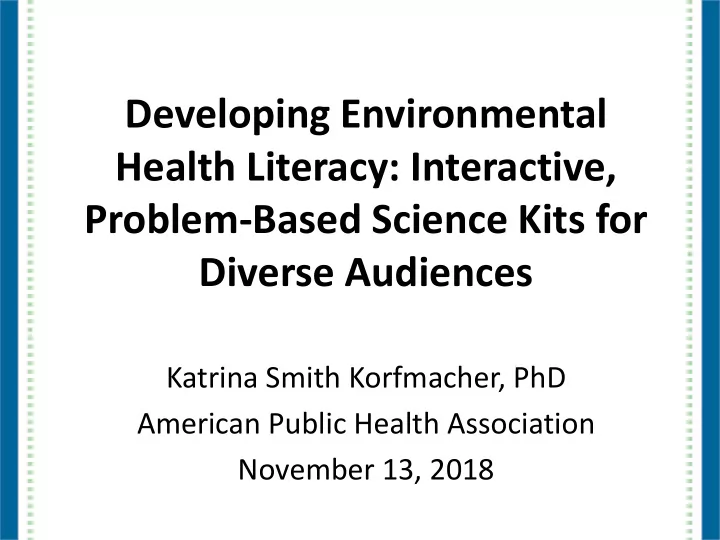

Developing Environmental Health Literacy: Interactive, Problem-Based Science Kits for Diverse Audiences Katrina Smith Korfmacher, PhD American Public Health Association November 13, 2018
Community Environmental Health Kits What are these kits? • How were the kits developed? • Let’s play with some of the kits! •
Science Take-Out Community Environmental Health Kits Hands-on activities to engage diverse community audiences in learning about environmental health issues. Kits guide participants to better understand underlying scientific principles. Kits promote discussions about ways to reduce exposures to environmental health hazards. Kits can be adapted to the background knowledge, interests, and literacy of the target audience.
Ready-to-Go! Science Take-Out Kits Kits contain all materials needed for the activity. Kits are convenient for use in a variety of settings - such as community centers, libraries, health fairs, museums, outreach centers, etc. Just add participants!
Community Environmental Health Kits Development Partners Science Take-Out University of Rochester (UR) Small business that creates, UR Environmental Health Sciences manufactures and sells Center - Community Outreach and science kits Engagement Core • Curriculum expertise • Environmental health expertise • Kit design expertise • Community outreach expertise University of North University of Texas WE ACT for Carolina Medical Branch Environmental Justice (UNC) (UTMB) (WEACT) Environmental health expertise and community outreach expertise
Kit Development Partners Community Offered broad perspectives - Members geographical areas, communities, types of UTMB, UNC, outreach programs, local EH WEACT concerns Univ. of Pilot tested the kits in their Rochester communities Provided feedback (presenter Science Take-Out and community) used to adapt kits for a broad audience
Pilot Tested in Diverse Settings
8 Community Environmental Health Kits A Healthy Home Testing Blood for Lead Preventing Lead Poisoning Safe City Water? Safe Well Water? Pesticide Safety Breast Cancer Risk Factors Skin Cancer and Sun Safety
Science Take-Out Kits Include: Kit bag containing all supplies required for the kit activities
Science Take-Out Kits Include: Participant guide with activity instructions
Science Take-Out Kits Include: Presenter guide – • Background information • Suggestions for eliciting group discussions of ways to reduce exposure to environmental health hazards.
Kits are Useful for a Wide Range of Participants • Citizen scientists • Health, science, or community fairs • Outreach groups • Health professional trainings • Trainings for local environmental health community leaders
A Healthy Home? Core Concepts: Hazardous substances in homes may create unhealthy environments. Actions should be taken to reduce exposures to potentially hazardous substances.
A Healthy Home? Analyze simulated tests for carbon monoxide, radon, mold, and lead. Explore ways that residents can reduce their exposure to hazardous substances.
Safe City Water Core Concepts: Water from a public water supply can become contaminated by lead as it flows from a water treatment plant to faucets. People can take action to reduce their exposure to lead in drinking water.
Safe City Water Test simulated water samples from a home and a day care center for lead. Identify health risks associated with lead in drinking water. Learn about ways to reduce lead exposure from tap water.
Breast Cancer Risk Factors Core Concept: An individual’s risk of developing breast cancer is influenced by specific genes, lifestyle choices, hormonal factors, and environmental exposures over their lifetime.
Breast Cancer Risk Factors Conduct simulated genetic tests for a BRCA1 gene mutation. Analyze a family history for breast cancer. Analyze information from a Breast Cancer Risks infographic.
Community Environmental Health kits will be available January 2019 www.sciencetakeout.com
If you want to make your own kits..... Kit documents and the instructions for making the kits will be available for free download from Science Take-Out. www.sciencetakeout.com
If you prefer the convenience of fully assembled kits… Fully assembled kits will be available for purchase from Science Take-Out. Materials for refilling the kits will also be available for purchase.
Kits are available through Science Take-Out beginning January 2019 www.sciencetakeout.com
Recommend
More recommend